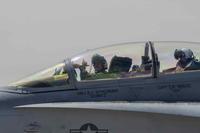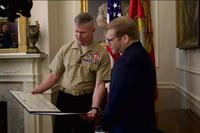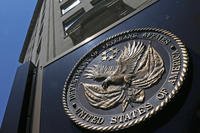
In 1992, the first line combat air strength of the Royal Saudi Air Force (RSAF) consisted of approximately 200 aircraft, organized into six fighter/ground-attack squadrons and five fighter-air defense squadrons. However, the RSAF declined during the 1990s' as the Kingdom's F-5EIIs and F-5s lost substantial operational capability.
In September 2007, Saudi Arabia and Britian signed a deal for the sale of 72 Eurofighter Typhoon fighter aircraft for 4.43bn (British pounds). The deal followed a 21bn al-Yamamah contract negotiated by the Thatcher government and involving the sale of BAE Systems Tornado jets and medical equipment.
Now, the US is reportedly considering a sale of the advanced stealth F-35 Lightning II to Saudi Arabia. In an effort to maintain military superiority, Israel has asked the Bush administration to purchase the the F-22 Raptor, despite the fact that foreign sales of the aircraft are currently banned by Congress.
In addition, Israeli defense officials have requested two new advanced JDAM models (laser-guided and immune to jamming) to offset the standard JDAM smart-bomb kits sold to Saudi Arabia that converts existing 500-, 1,000- and 2,000-pound unguided free-fall bombs into accurately guided "smart" weapons.
Rep. Anthony Weiner, D-N.Y., has expressed concern over US arms sales to Saudi Arabia, noting that the Kingdom has not been a true ally in furthering the United States interests in the Middle East, and noted that about 40 percent of all foreign fighters [in Iraq] are Saudi.
However, according to US Secretary of State Condoleeza Rice, the sale of arms to Saudi Arabia and other Gulf States will help bolster forces of moderation and support a broader strategy to counter the negative influences of al Qaeda, Hezbollah, Syria, and Iran."
Nevertheless, Daryl G. Kimball of the Arms Control Association has compared the Bush administration arms sales policy of sell, sell, sell to throwing gasoline on a brush fire.
The possibility of a rogue pilot or the eventual overthrow of the Saudi regime also concerns officials and analysts. Dr. Michael Donovan of the CDI emphasized that as of Sept. 11, [Saudi] stability can no longer be taken for granted...The Islamic values upon which they based their authority for so long are now, seemingly, in conflict with forces they could not control even if they chose to do so.
(Gouge: NC)








